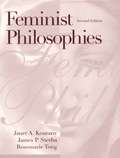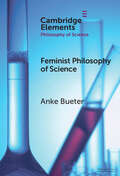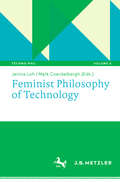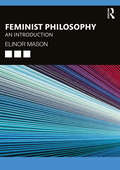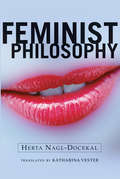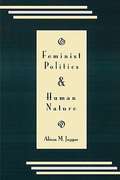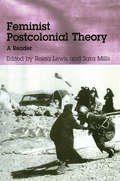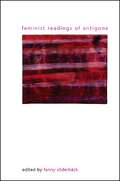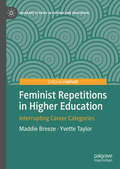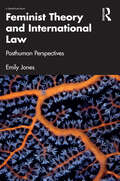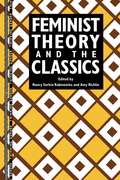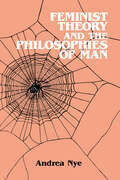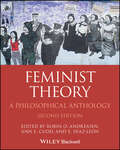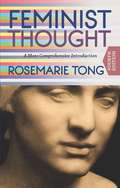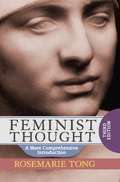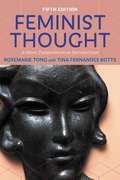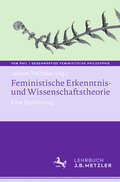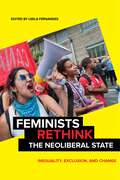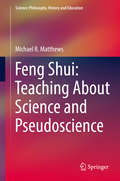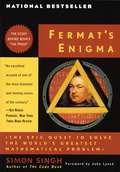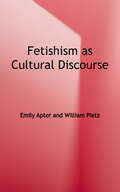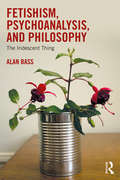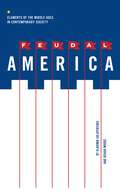- Table View
- List View
Feminist Philosophies: Problems, Theories, and Applications
by James P. Sterba Rosemarie Tong Janet A. KouranyThis anthology of 40 readings combines both an extensive discussion of the major problems confronting women with an in-depth analysis of the alternative theoretical and practical means for resolving these issues.
Feminist Philosophy of Science (Elements in the Philosophy of Science)
by Anke BueterFeminist scholars have identified pervasive gender discrimination in science as an institution, as well as gender bias in the very content of many scientific theories. An ameliorative project at heart, feminist philosophy of science has inquired into the social and epistemological roots and consequences of these problems and into their potential solutions. Most feminist philosophers agree on a need for diversity in scientific communities to counter the detrimental effects of gender bias. Diversity could thus serve as a unifying concept for a potential consensus of the field. Yet there are substantial differences in the kinds and roles of diversity envisaged. This element argues that we need diversity, both in terms of social locations and of values, to overcome former biases and blind spots. Diversity as such, however, is insufficient. To reap its epistemic benefits, diversity also needs to be institutionalised in a way that counters various forms of epistemic injustice.
Feminist Philosophy of Technology (Techno:Phil – Aktuelle Herausforderungen der Technikphilosophie #2)
by Mark Coeckelbergh Janina LohThere has been little attention to feminism and gender issues in mainstream philosophy of technology and vice versa. Since the beginning of the so-called »second wave feminism« (in the middle of the 20th century), there has been a growing awareness of the urgency of a critical reflection of technology and science within feminist discourse. But feminist thinkers have not consistently interpreted technology and science as emancipative and liberating for the feminist movement. Because technological development is mostly embedded in social, political, and economic systems that are patriarchally hierarchized, many feminists criticized the structures of dominance, marginalization and oppression inherent in numerous technologies. Therefore, the question of defining and ascribing responsibility in technics and science is essential for this anthology – regarding for instance the technological transformation of labor, the life in the information society, and the relationship between humans and machines.
Feminist Philosophy: An Introduction
by Elinor MasonFeminist Philosophy: An Introduction provides a comprehensive coverage of the core elements of feminist philosophy in the analytical tradition. Part 1 examines the feminist issues and practical problems that confront us as ordinary people. Part 2 examines the recent and historical arguments surrounding the subject area, looking into the theoretical frameworks we use to discuss these issues and applying them to everyday life. With contemporary and lively debates throughout, Elinor Mason provides a rigorous and yet accessible overview of a rich array of topics including: feminism in a global context work and care reproductive rights sex work sexual violence and harassment sexism, oppression, and misogyny intersectionality objectification consent ideology, false consciousness, and adaptive preferences. An outstanding introduction which will equip the reader with a thorough knowledge of the fundamentals of feminism, Feminist Philosophy is essential reading for those approaching the subject for the first time.
Feminist Philosophy: Re-reading The Canon In German (Feminist Theory and Politics #Vol. 13)
by Herta Nagl-DocekalIn four powerful chapters, internationally acclaimed philosopher Herta Nagl-Docekal not only confronts our notions of sex, art, reason, and politics with the persistent problem of the hierarchical relations of the sexes but redefines these stances making them adequate perspectives for today.
Feminist Politics And Human Nature
by Alison M. JaggarWritten about twenty years after the birth of the women's movement in the 1960's, Feminist Politics and Human Nature analyzes that movement's writings and goals as political theory. Alison M. Jaggar attempts to sort the varied and often contradictory statements of the feminist movement into coherent systems of thought. In doing so, she traces the assumptions about human nature that underlay each system and its implied or explicit "solutions" to women's inequality.
Feminist Popular Education in Transnational Debates
by Linzi Manicom Shirley WaltersThis book is a collection of grounded accounts by feminist popular educators and reflects critically on processes of collective learning and self- and social transformation in various geopolitical settings. Engaging contemporary feminist political issues and theory, contributors explore emerging pedagogical practices.
Feminist Postcolonial Theory: A Reader
by Sara Mills Reina LewisFeminism and postcolonialism are allies, and the impressive selection of writings brought together in this volume demonstrate how fruitful that alliance can be. Reina Lewis and Sara Mills have assembled a brilliant selection of thinkers, organizing them into six categories: "Gendering Colonialism and Postcolonialism/Radicalizing Feminism," "Rethink
Feminist Readings of Antigone (SUNY series in Gender Theory)
by Fanny SöderbäckFeminist Readings of Antigone collects the most interesting and provocative feminist work on the figure of Antigone, in particular looking at how she can figure into contemporary debates on the role of women in society. Contributors focus on female subjectivity and sexuality, feminist ethics and politics, questions of race and gender, psychoanalytic theory, kinship, embodiment, and tensions between the private and the public. This collection seeks to explore and spark debate about why Antigone has become such an important figure for feminist thinkers of our time, what we can learn from her, whether a feminist politics turning to this ancient heroine can be progressive or is bound to idealize the past, and why Antigone keeps entering the stage in times of political crisis and struggle in all corners of the world. Fanny Söderbäck has gathered classic work in this field alongside newly written pieces by some of the most important voices in contemporary feminist philosophy. The volume includes essays by Judith Butler, Adriana Cavarero, Tina Chanter, Luce Irigaray, and Julia Kristeva.
Feminist Repetitions in Higher Education: Interrupting Career Categories (Palgrave Studies in Gender and Education)
by Yvette Taylor Maddie BreezeTo do feminism and to be a feminist in higher education is to repeat oneself: to insist on gender equality as more than institutional incorporation and diversity auditing, to insert oneself into and against neoliberal measures, and to argue for nuanced intersectional feminist analysis and action. This book returns to established feminist strategies for taking up academic space, re-thinking how feminists inhabit the university and pushing back against institutional failures. The authors assert the academic career course as fundamental to understanding how feminist educational journeys, collaborations and cares and ways of knowing stretch across and reconstitute academic hierarchies, collectivising and politicising feminist career successes and failures. By prioritising interruptions, the book navigates through feminist methods of researcher reflexivity, autoethnography and collective biography: in doing so, moving from feminist identity to feminist practice and repeating the potential of queer feminist interruptions to the university and ourselves.
Feminist Theory and International Law: Posthuman Perspectives
by Emily JonesFeminist approaches to international law have been mischaracterised by the mainstream of the discipline as being a niche field that pertains only to women’s lived experiences and their participation in decision-making processes. Exemplifying how feminist approaches can be used to analyse all areas of international law, this book applies posthuman feminist theory to examine the regulation of new and emerging military technologies, international environmental law and the conceptualisation of the sovereign state and other modes of legal personality in international law. Noting that most posthuman scholarship to date is primarily theoretical, this book also contributes to the field of posthumanism through its application of posthuman feminism to international law, working to bridge the theory and practice divide by using posthuman feminism to design and call for legal change. This interdisciplinary book draws on an array of fields, including philosophy, queer and feminist theories, postcolonial and critical race theories, computer science, critical disability studies, science and technology studies, marine biology, cultural and media studies, Indigenous onto-epistemologies, critical legal theory, political science and beyond to provide a holistic analysis of international law and its inclusions and exclusions. This interdisciplinary book will appeal to students and scholars with interests in legal, feminist and posthuman theory, as well as those concerned with the contemporary challenges faced by international law.
Feminist Theory and the Classics (Thinking Gender)
by Nancy Sorkin Rabinowitz Amy RichlinFirst published in 1993. Routledge is an imprint of Taylor & Francis, an informa company.
Feminist Theory and the Philosophies of Man
by Andrea NyeFirst published in 1990. Routledge is an imprint of Taylor & Francis, an informa company.
Feminist Theory: A Philosophical Anthology (Blackwell Philosophy Anthologies)
by Ann E. Cudd Robin O. Andreasen E. Díaz‐LeónBringing together influential voices and groundbreaking new essays, Feminist Theory: A Philosophical Anthology examines the key questions at the heart of feminist philosophy through a clear structure and accessible yet rigorous content. This carefully curated selection of classic and contemporary essays emphasizes the flourishing growth of feminist thought over time, ranging from foundational texts by Simone de Beauvoir, Judith Butler, and Kimberlé Crenshaw, to new essays by contemporary scholars like Kate Manne, Talia Mae Bettcher, and Robin Dembroff. This edition expands on the original with fresh scholarship and a broader range of perspectives on gender, identity, knowledge, production and justice. New essays address intersectionality, gender identity, the critique of ideal theory, feminist critiques of traditional ethics, the impact of social norms on autonomy and epistemic injustice, and much more. Including critiques of traditional philosophical frameworks and self-reflection of feminism itself, this essential collection highlights how feminist theory shapes and challenges our current understanding of society. Designed for students and scholars in philosophy, gender studies, and social theory, Feminist Theory: A Philosophical Anthology is ideal for students taking courses in feminist philosophy and feminist theory, educators in social sciences and humanities, and activists and professionals seeking a nuanced understanding of feminist philosophy.
Feminist Thought
by Rosemarie Putnam TongFeminist Thought offers a clear, comprehensive, and incisive introduction to the major traditions of feminist theory, from liberal feminism, radical feminism, and Marxist and socialist feminism to care-focused feminism, psychoanalytic feminism, and ecofeminism. The fourth edition has been thoroughly revised and expanded, including a new section on existentialism as it relates to postmodern feminism in Chapter 5, and a new conclusion that contemplates third-wave feminism and the future directions of feminist theory. Chapter 6 on women of color feminisms was also significantly revised and expanded by Tina Fernandes of the University of North Carolina at Charlotte. Learning tools like the new end-of-chapter discussion questions, and the bibliography, organized by topics within chapters, make Feminist Thought an essential resource for students and thinkers who want to understand the theoretical origins and complexities of contemporary feminist debates.
Feminist Thought
by Rosemarie TongA clear, comprehensive, and indispensable introduction to the major traditions of feminist theory, Feminist Thought includes incisive, critical examinations of liberal feminism, radical feminism, Marxist and socialist feminism, and ecofeminism.<P><P> This third edition has been thoroughly reformulated and expanded to include the latest developments in feminist thought, including a new chapter on care-focused feminism (Chapter 5), an exploration of the connections of multicultural and global feminism with postcolonial feminism (Chapter 6), and a close consideration of the links between postmodern feminism and third-wave feminism (Chapter 8). Key feminist theorists such as Judith Butler, Martha Nussbaum, and Eva Feder Kittay receive new or extended discussions. The bibliography, organized by topics within chapters, provides an invaluable aid to further research. An illuminating guide to the diversity of feminism, Feminist Thought continues to serve as the essential resource for students and thinkers who want to understand the theoretical origins and complexities of contemporary feminist debates. Contents Introduction; The Diversity of Feminist Thinking 1. Liberal Feminism 2. Radical Feminism; Libertarian and Cultural Perspectives 3. Marxist and Socialist Feminism; Classical and Contemporary 4. Psychoanalytic Feminism 5. Care-focused Feminism 6. Multicultural, Global, and Postcolonial Feminism 7. Ecofeminism 8. Postmodern and Third-wave Feminism Conclusion; Margins and Centers This edition is in two volumes. The first volume ISBN is 9781458781574.
Feminist Thought: A More Comprehensive Introduction
by Rosemarie Tong Tina Fernandes BottsA classic resource on feminist theory, Feminist Thought offers a clear, comprehensive, and incisive introduction to the major traditions of feminist theory, from liberal feminism, radical feminism, and Marxist and socialist feminism to care-focused feminism, psychoanalytic feminism, and ecofeminism. The fifth edition has been thoroughly revised, and now includes a new chapter on Third Wave and Third Space Feminism. Also added to this edition are significantly expanded discussions on women of color feminisms, psychoanalytic and care feminisms, as well as new examinations of queer theory, LGBTQ and trans feminism.Learning tools like end-of-chapter discussion questions and the bibliography make Feminist Thought an essential resource for students and thinkers who want to understand the theoretical origins and complexities of contemporary feminist debates.
Feministische Erkenntnis- und Wissenschaftstheorie: Eine Einführung (fem.phil | Gegenwärtige feministische Philosophie)
by Liane Meyer Marius ThienenkampWie hängen Wissen und Politik zusammen? Wie beeinflussen Gender und andere soziale Faktoren wissenschaftliche Untersuchungen? Wie formt unsere kulturell-historische Verankerung unser Denken über die Welt? Diese und weitere Fragen werden in der feministischen Erkenntnis- und Wissenschaftstheorie diskutiert, die sich in den 1970er Jahren im Zuge der internationalen Frauenbewegungen zunächst als feministische Kritik an sexistischen wie auch rassistischen Ideologien in der Wissenschaft entwickelte. Mittlerweile ist sie zu einem interdisziplinären Diskurs über die Zusammenhänge von Wissen(schaft), sozial-politischer Identität und kulturell-historischer Verortung angewachsen und bietet verschiedene kritische Strategien für bessere Darstellungen der Welt. Das Lehrbuch gibt einen aktuellen Überblick über die wichtigsten Ansätze und Konzepte feministischer Erkenntnis- und Wissenschaftstheorie. Darüber hinaus enthält es vertiefte Perspektiven auf Wissen, Wissenschaft und epistemische Gerechtigkeit von der Antike bis zur Gegenwart sowie ein Glossar zentraler Begriffe.
Feminists Rethink the Neoliberal State: Inequality, Exclusion, and Change
by Leela FernandesA rich set of feminist perspectives on the varied and often contradictory nature of state practices, structures, and ideologies Growing socio-economic inequality and exclusion are defining features of the twenty-first century. While debates on globalization, free trade, and economic development have been linked to the paradigm of “neo-liberalism,” it does not explain all the forms of social change that have been unfolding in comparative contexts. Feminists Rethink the Neoliberal State provides a timely intervention into discussions about the boundaries, practices, and nature of the post-liberalization state, suggesting that an understanding of economic policies, the corresponding rise of socio-economic inequality, and the possibilities for change requires an in-depth reconceptualization.Drawing on original field research both globally and within the United States, this volume brings together a rich set of perspectives on the varied and often contradictory nature of state practices, structures and ideologies in the post-liberalization era. The essays develop an interdisciplinary approach that treats an understanding of historically-specific forms of inequality—such as gender, race, caste, sexuality and class—as integral to, rather than as after-effects of, the policies and ideologies associated with the “neoliberal project.” The volume also tackles central questions on the restructuring of the state, the state’s power operations, the relationship between capital and the state, and its interactions with the institutions and organizational forms of civil society in the post-liberalization era. As such, Feminists Rethink the Neoliberal State examines both what is distinctive about this post-liberalization state and what must be contextualized as long-standing features of modern state power. A truly international and interdisciplinary volume, Feminists Rethink the Neoliberal State deepens our understanding of how policies of economic liberalization shape and produce various forms of inequality.
Feng Shui: Teaching About Science and Pseudoscience (Science: Philosophy, History and Education)
by Michael R. MatthewsThis book provides a richly documented account of the historical, cultural, philosophical and practical dimensions of feng shui. It argues that where feng shui is entrenched educational systems have a responsibility to examine its claims, and that this examination provides opportunities for students to better learn about the key features of the nature of science, the demarcation of science and non-science, the characteristics of pseudoscience, and the engagement of science with culture and worldviews. The arguments presented for feng shui being a pseudoscience can be marshalled when considering a whole range of comparable beliefs and the educational benefit of their appraisal.Feng shui is a deeply-entrenched, three-millennia-old system of Asian beliefs and practices about nature, architecture, health, and divination that has garnered a growing presence outside of Asia. It is part of a comprehensive and ancient worldview built around belief in chi (qi) the putative universal energy or life-force that animates all existence, the cosmos, the solar system, the earth, and human bodies. Harmonious living requires building in accord with local chi streams; good health requires replenishment and manipulation of internal chi flow; and a beneficent afterlife is enhanced when buried in conformity with chi directions. Traditional Chinese Medicine is based on the proper manipulation of internal chi by acupuncture, tai-chi and qigong exercise, and herbal dietary supplements. Matthews has produced another tour de force that will repay close study by students, scientists, and all those concerned to understand science, culture, and the science/culture nexus.Harvey Siegel, Philosophy, University of Miami, USA With great erudition and even greater fluidity of style, Matthews introduces us to this now-world-wide belief system.Michael Ruse, Philosophy, Florida State University, USA The book is one of the best research works published on Feng Shui. Wang Youjun, Philosophy, Shanghai Normal University, China The history is fascinating. The analysis makes an important contribution to science literature.James Alcock, Psychology, York University, Canada This book provides an in-depth study of Feng Shui in different periods, considering its philosophical, historical and educational dimensions; especially from a perspective of the ‘demarcation problem’ between science and pseudoscience. Yao Dazhi, Chinese Academy of Sciences, China
Ferdinand Tönnies und die Soziologie- und Geistesgeschichte
by Cornelius Bickel Sebastian KlaukeDer Band beleuchtet das Schaffen von Ferdinand Tönnies in Bezug auf die geistes- und sozialgeschichtlichen Kontexte seiner Zeit. Tönnies erweist sich als über die Grenzen der Soziologie hinaus relevant.
Fermat's Enigma: The Epic Quest to Solve the World's Greatest Mathematical Problem
by Simon Singhxn + yn = zn, where n represents 3, 4, 5, ...no solution"I have discovered a truly marvelous demonstration of this proposition which this margin is too narrow to contain."With these words, the seventeenth-century French mathematician Pierre de Fermat threw down the gauntlet to future generations. What came to be known as Fermat's Last Theorem looked simple; proving it, however, became the Holy Grail of mathematics, baffling its finest minds for more than 350 years. In Fermat's Enigma--based on the author's award-winning documentary film, which aired on PBS's "Nova"--Simon Singh tells the astonishingly entertaining story of the pursuit of that grail, and the lives that were devoted to, sacrificed for, and saved by it. Here is a mesmerizing tale of heartbreak and mastery that will forever change your feelings about mathematics.
Fetishism As Cultural Discourse
by Emily Apter William PietzFetishism is a term widely disseminated in literary and cultural studies. It carries a variety of generic meanings. Most of these derive to some degree from Marxist and psychoanalytic discourses, where the term fetishism has technical significance. This book will engage and challenge a wide audience of academic and nonacademic readers, including specialists and students in the fields of anthropology, history, literature, film, psychoanalysis, visual arts, feminist theory, Marxian criticism, and cultural studies.
Fetishism, Psychoanalysis, and Philosophy: The Iridescent Thing
by Alan BassFetishism, Psychoanalysis, and Philosophy explores how and why Freud’s late work on fetishism led to the beginnings of a re-formulation of the theory and practice of psychoanalysis. Freud himself, however, was unaware of the long history of the concept of fetishism, a history crucial to understanding the concept. This book contains three main thrusts. One is historical, tracing the development of the concept of fetishism from the 16th century onwards. The focus here is on two important thinkers: Charles de Brosses from the 18th century, and Auguste Comte from the 19th. The second thrust is philosophical. Fetishism is always about the relation between the mind and things. Martin Heidegger, Jaques Derrida, and Maurice Merleau-Ponty have made essential contributions in this area, contributions which have important scientific relevance. The third thrust integrate the historical, philosophical, and psychoanalytic investigations of fetishism. It also looks at Wallace Stevens’ poetic meditation on mind and thing, which helps to illuminate everything that precedes. This comprehensive book features careful integration of the historical, philosophical, and psychoanalytic investigations of fetishism. It will contribute to opening new ways of thinking about the mind and how it is structured, so that fetishism is possible. Fetishism, Psychoanalysis, and Philosophy will appeal to psychoanalysts and psychoanalytic psychotherapists as well as philosophy scholars.
Feudal America: Elements of the Middle Ages in Contemporary Society
by Vladimir Shlapentokh Joshua WoodsDo Americans live in a liberal capitalist society, where evenhanded competition rules the day, or a society in which big money, private security, and personal relations determine key social outcomes? Vladimir Shlapentokh and Joshua Woods argue that the answer to these questions cannot be found among the conventional models used to describe the nation. Offering a new analytical tool, the authors present a provocative explanation of the nature of contemporary society by comparing its essential characteristics to those of medieval European societies. Their feudal model emphasizes five elements: the weakness of the state and its inability to protect its territory, guarantee the security of its citizens, and enforce laws; conflicts and collusions between and within organizations that involve corruption and other forms of illegal or semilegal actions; the dominance of personal relations in political and economic life; the prevalence of an elitist ideology; and the use of private agents and organizations for the provision of safety and security. Feudal America urges readers to suspend their forward-thinking and futurist orientations, question linear notions of social and historical progression, and look for explanations of contemporary social problems in medieval European history.
